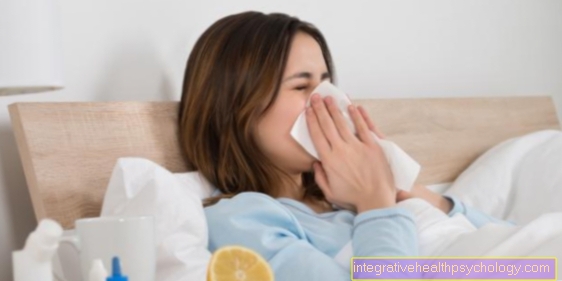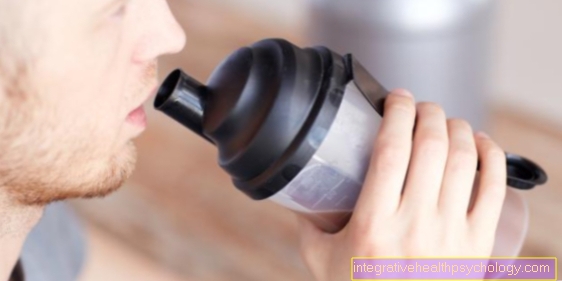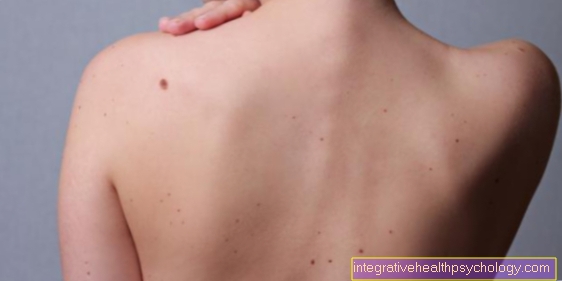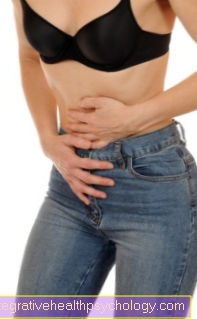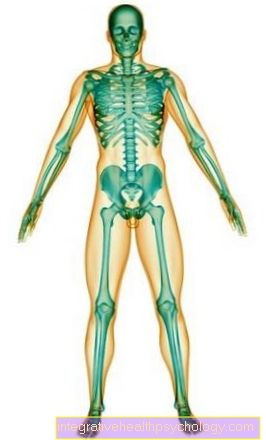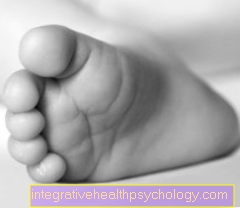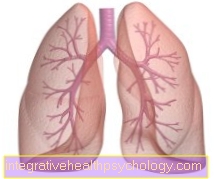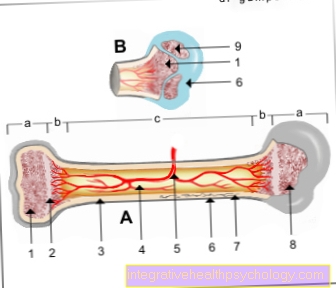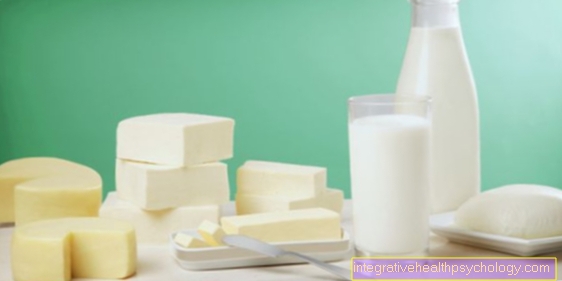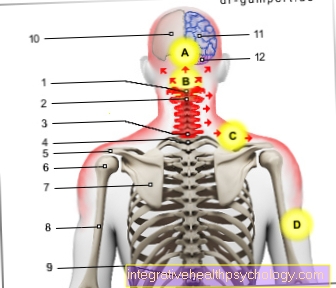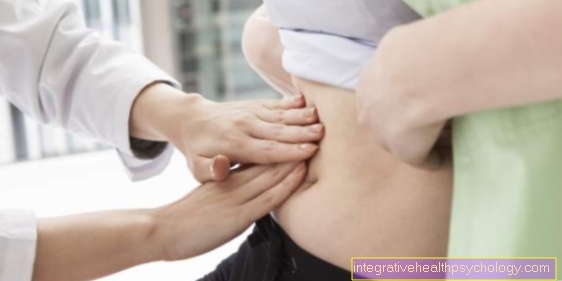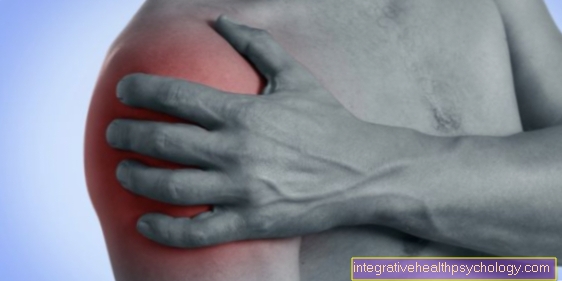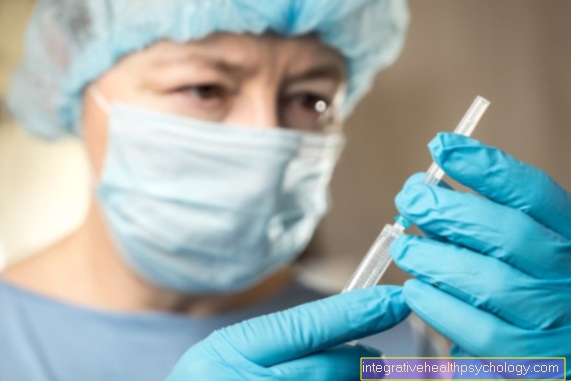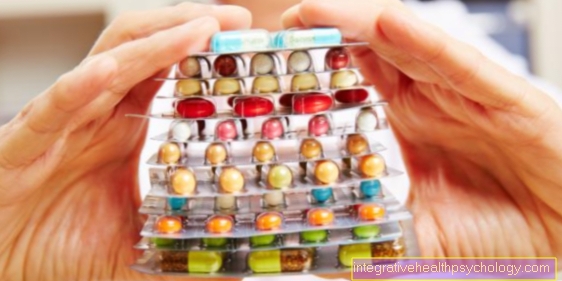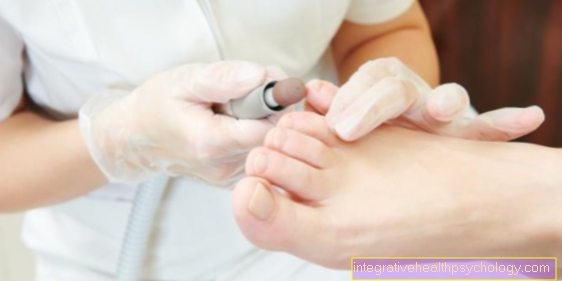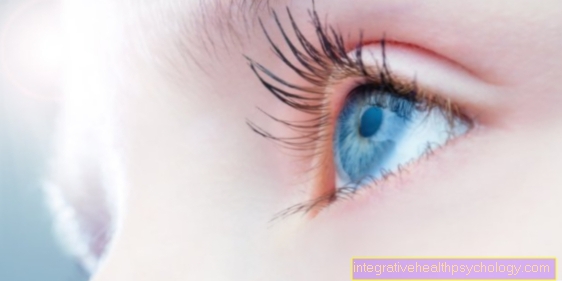Diet for diarrhea
introduction
When a patient suffers from diarrhea, there is often only symptomatic treatment that can help. By far the most important thing in diarrheal diseases is an adequate intake of fluids and salt, as diarrhea loses both a lot of fluids and a lot of electrolytes.
To compensate for the losses, some, mostly herbal, preparations are available. In addition to these herbal supplements, general measures can also be used, which are primarily intended to ensure fluid and salt intake. Measures to stop the diarrhea are not recommended from a medical point of view, as pathogens and their toxins are excreted naturally (although unpleasant).

General information on eating habits
First of all, it is important to eat several small meals a day rather than a few large ones. In the first days of a diarrheal illness, the symptoms can also be adjusted to the number of meals. That means, if the patient suffers from severe diarrhea, possibly also with abdominal pain, the meals should be rather small. As the symptoms improve, the amount can then be increased.
It is important that you should completely avoid flatulent and acidic foods at first. Food with a high sugar content or high carbohydrate content should also be avoided during acute diarrhea. At least as important as the foods that should be consumed during a diarrheal illness in order to alleviate the symptoms as quickly as possible, is the daily intake. The diarrhea leads to a loss of fluid that the body is not used to. The body usually loses this fluid within the first acute days of a diarrheal illness. If the loss of fluid is not compensated for, the abdominal cramps typical of diarrheal diseases occur. For this reason, it is important to drink at least 2-3 liters of liquid. Here, you should especially drink low-carbon mineral water or tea (fennel and chamomile tea). Acidic juices such as lemon or orange juice should be avoided to protect the stomach and intestines.
Recommended foods
There are some recommendations for suitable foods to consume if you have diarrhea. Mostly these are particularly gentle foods that relieve the intestines. oatmeal belong to the gentle foods that can be safely consumed in the case of diarrheal diseases. Above all, melted flakes should be eaten here. Even a flake soup can be mixed with water and consumed.
Although many types of fruit strongly acidify the stomach, the consumption of Apples safe for diarrheal diseases and even leads to a relief of the symptoms. Because there is substance in the peel of the apple pectin is located, it comes to an early after apple consumption Relief from watery diarrhea. It is very effective when apples are grated and then eaten. Also contain a lot of pectin Bananas, which are also very suitable for consumption in the case of acute diarrhea.
Since many minerals are washed out of the body in addition to the fluids in diarrhea, it is important that the Salts and minerals to be returned to the body as soon as possible to prevent a deficiency. It is best suited for mineral intake Vegetable broth. On the one hand, you take in liquid here, as well as minerals and salts at the same time.
Carrots protect the stomach and calm the gastrointestinal tract. The classic of diarrhea nutrition zwieback- is also part of the daily diet in case of diarrhea and ensures calming of the gastrointestinal tract.
Not recommended foods
There are also foods that should not be eaten during an acute diarrheal illness. You can the Diarrhea even worsen and the Extend treatment time.
To be mentioned above all Dairy productswhich should not be taken during the acute diarrheal illness. On the one hand, it is because dairy products always have a high percentage of fat, on the other hand, it can also be that diarrhea with one temporary Lactase deficiency and so dairy products cannot be properly broken down and digested. All of this can lead to a prolongation of the diarrheal illness.
Spicy foodsthat put a lot of strain on the intestines should also be avoided. These include Chilli, paprika and onions. Furthermore, foods that are very difficult to digest and put a lot of strain on the intestines should be avoided. Above all, greasy and oily dishes should be mentioned here. Fried foods for this reason should not be eaten. Drinking from coffee should also be severely restricted. Coffee has more of a laxative effect and for this reason can even prolong the recovery process. Sugary drinks should also be avoided, as foods and drinks with high sugar content even have a laxative effect. The one previously recommended for diarrheal diseases cola should therefore be avoided.
Nutritional example
If a patient suffers from acute diarrheal illness, he should own his Menu align accordingly. This should always be from one sufficient amount of water to drink be accompanied so that the lost fluid can quickly get back into the body. In the morning, e.g. oatmeal to be eaten with water grated apples with peel. As suitable drinks would be Chamomile or fennel tea recommended, which additionally protect and protect the gastrointestinal tract.
Noon can then zwieback can be eaten as a side dish too Bananaswhich also have a protective function. Bread can also be eaten. But this should be pure wheat bread be dispensed with as well as Whole grain bread.
In the evening, e.g. the lost minerals and salts with the help of a vegetable soup to be recovered. Overall, the amount of food should be limited and smaller meals should be eaten. In most cases, a gentle diet is sufficient for the time when the diarrhea is acute. Mostly it already follows few days a quick improvement of the diarrhea with the right diet.
Cola and pretzel sticks
A long-established tip for people with diarrhea is the consumption of cola and pretzel sticks. But is this home remedy treatment still valid today? Partly yes and part no.
It is true that the diarrhea removes minerals and salts from the body that cannot be easily replenished with the usual diet. Lye biscuits in connection with salt leads to a quick replenishment of the lost salts and minerals. For this reason one can certainly agree with the claim that "pretzel sticks help with diarrhea".
With the cola it's different. Here, too, it was assumed that this sugary caffeine drink leads to a rapid improvement in diarrhea. Since cola consists almost exclusively of sugar, one must nowadays advise against drinking cola if you have an acute diarrheal illness. Because sugar works additionally laxative and can even do the Extend recovery time significantly.
Summary of the main points
As a rule, diarrhea is caused by viral infections. Usually only symptomatic treatment is left to alleviate the symptoms.
That is important Drink approx. 2 liters per day to be observed. Since a lot of fluid is withdrawn from the body due to diarrhea, it is imperative that the fluid reservoirs be filled up quickly. Here should unsweetened teas or carbonated water are used.
There are also numerous dishes that help with diarrhea and can therefore be recommended. To be mentioned Bananas or apples. Both fruits have a high proportion of what is known as pectin. This is a binding agent and ensures that fluid is withdrawn from the stool and thus thickens. Grated apples develop the effect of the pectin even more strongly and should be used for any diarrheal illness. Fruit juices, on the other hand, should be avoided.
They are also very digestible oatmealwhich, however, should be consumed without milk. They have a calming effect on the inside of the stomach and the intestines. Vegetable broths not only help to get the lost fluids back into the body, but also the salts that have been lost through the diarrhea.
However, some foods should be avoided. Which includes Dairy products, because on the one hand they usually contain a lot of fat, on the other hand there is a temporary lactase deficiency in the case of diarrhea. Also as earlier wrongly assumed, should cola not drinking during acute diarrhea. Cola is very sugary and can also have additional laxative effects. Fatty foods, as well as fried or deep-fried foods should also initially not be eaten in the case of acute diarrhea.
Nutrition in babies and children
Diarrhea in young children and babies is very common. In most cases, diarrhea at this age is infection-related, but sometimes it can Food intolerance stand behind the complaints. As such, the nutrition tips do not differ from those of adults.
First and foremost, with a small child, as with adults, it is important to ensure that enough liquid is drunk. Because the loss of fluid leads to the actual symptoms in the sense of severe abdominal pain and cramps. Furthermore, the child should only during the acute complaint phase Light food eat. It is especially suitable for this unsweetened porridges, such as. unsweetened apple puree or banana puree. Also can light vegetable soups given to the toddler.
On the consumption of However, dairy products and fruit juices should be avoided become. If there is no improvement with the change in diet, a treatment attempt can also be made Perenterol® junior to be undertaken. This preparation is a Yeast productthat is supposed to thicken the stool.
Home remedies for self-treatment
You can also find more information here: Home remedies for diarrhea
Tea fasting
For one or two days only 2 - 3 liters of tea per day. We recommend green tea rich in tannin (let steep for 20 minutes), fennel tea and chamomile tea. Peppermint tea has an antispasmodic effect. No sugar is added to the tea.
Black tea can also relieve the symptoms of diarrhea. You can read more detailed information on this topic here: Black tea for diarrhea
WHO solution
Basically, diarrhea, because of the life-threatening water and mineral loss, should be more on the Hydration be respected. This becomes especially important with infants and young children. In addition to infusion therapy, there is the possibility of using special solutions that are drunk to counteract the loss of fluids and minerals. These solutions are based on a recommendation by the WHO (World health organization) and are therefore also called WHO solutions. There is a ready-made solution of 20g dextrose, 3.5g table salt, 1.5g potassium chloride and 2.5g sodium bicarbonate which is available in the pharmacy and especially for diarrhea in babies and with Diarrhea in young children is used.
You can also produce the WHO solution yourself:
Fill up 1-2 tablespoons of sugar, 1 teaspoon of table salt with 1l of natural orange juice. Or you mix the juice of 4 oranges with 7 teaspoons of sugar and one teaspoon of table salt. Add 1 liter of boiled water and stir well. Cola and pretzel sticks make little sense in the case of diarrhea in babies. Cola contains too much sugar and too little salt and is because of that caffeine especially not recommended for children. In addition, the loss of fluid should never be compensated for with alcohol, coffee or milk.
Raw apple diet
At this diet to HOARSE and MORO 250g of washed apples with their skin (but without kernels and cores) are freshly grated on a glass grater at every mealtime and a little lemon juice drizzled over them. You can spread 5–6 single meals over the day. Apples contain pectins (mainly under the skin), which swell strongly and absorb toxic decomposition products, for example from germs, in the intestine. Alternatively, a finished product can be used (trade name Aplona). 25–40g of this corresponds to 1–1.5 kg of apples. Children receive 20 to 25 g of it daily mixed with liquid, adults 25 to 40 g.
carrot soup
For this Moro diet 500 g carrots cut into cubes are boiled in 1 liter of water and then pureed. The soup is made up to one liter and seasoned with 3 g of table salt. The extent to which this soup can compensate for mineral loss in diarrhea is, however questionable.
Further therapy options
If conventional and nutritional treatments do not help, a drug treatment attempt to be undertaken. For this purpose, natural drugs are available, which can be taken with practically no side effects, but also numerous chemical preparations, which should, however, be taken with caution. The natural preparations include Perenterol®, a yeast preparation and e.g. also Omniflora®, the probiotic bacteria includes. An old drug is that Charcoal tablet. This is a substance that increasingly draws water out of the stool and thus results in a rapid thickening of the thin stool.
If these measures do not help, then one should at the latest Stool culture by the doctor which should show whether germs that do not belong to the normal intestinal flora can be found in the intestine. Quite often it follows longer treatment times with antibiotics to a loss of the important intestinal bacteria. As a result, only one or two groups of bacteria remain in the intestines and can grow, which in turn can lead to severe diarrhea. Often times it is the bacterium Clostridium difficilewhich spreads strongly in this way and often leads to severe diarrhea. In the event of evidence, treatment should be given immediately with an antibiotic.
Not to be treated, always recurring diarrhea should always give rise to one Colonoscopy give.
Conditions that can lead to diarrhea
Here you will find a brief description of some of the most important causes of diarrhea. For the individual clinical pictures, therapy and a possible need to see a doctor are also briefly outlined.
Acute and chronic enteritis
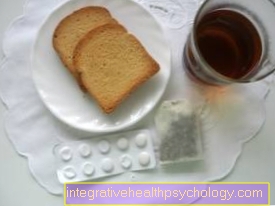
A acute enteritis or gastroenteritis (if the stomach is affected) or Enterocolitis (if the large intestine is also affected) is an inflammatory change in the digestive tract with various causes and symptoms.
Food poisoning
To a Food poisoning it occurs when food is consumed that contains pathogenic germs or when there is a strong increase in germs that are actually not pathogenic. As a result, accumulate in the food toxic metabolic products the germs and after consumption lead to inflammatory damage to the intestinal mucosa. Such bacterial food contamination occasionally leads to mass illnesses when meals prepared in large kitchens are not sufficiently cooled. The patients complain of diarrheadiarrhea and Vomit. In most cases, therapy is not necessary because the symptoms subside as soon as the germs causing the problem are eliminated.
Samonella infection
These are digestive tract infections serious illnesses. They are triggered by foods such as eggs and products made with them poultry. These foods are common with Salmonella afflicted and need to deal with them minimum hygienic requirements to be met. The germs often multiply in undercooked foods and foods that contain raw eggs. Salmonella are killed at around 60 degrees.
Be with Salmonella eaten contaminated food, it comes after an incubation period (Time from infection to onset of the disease) from 8 - 24 hours, too Vomiting, diarrhea, fever and stomach pain. This disease can be life-threatening in already weakened people. It will be a Antibiotic therapy necessary and the fluids lost due to the massive diarrhea must be supplied again. In severe cases, this is done by infusion.
Salmonella diseases are according to the Federal Disease Act notifiable. The best protection against salmonella is to cook poultry and foods that contain raw eggs well. Always store raw poultry separately and keep them away from other foods during processing.
You can find more information under our topic Salmonella
Traveller's diarrhea
Mainly when traveling to southern countries it often comes to the as "Traveller's diarrhea“Short-lasting diarrheal illness that is associated with abdominal pain, nausea and vomiting. Also symptoms like fever, and body aches a headache are possible. The cause of this acute illness is unclear. The usual pathogens of diarrhea cannot be detected in these patients. The change in diet could also be ruled out as a cause. It is most likely that germs will be absorbed with food, although they are not yet known.
Of the nutrition There is a certain preventive importance when traveling, in particular not drinking tap water and preferring cooked food to raw food.
Gross diet errors and medication
One of the most common causes of enteritis (diarrhea) is failure of one diet like enjoying large quantities of unripe fruit, very fatty and very cold dishes and the Abuse of alcohol. Also certain drugs like for example Salicylic acid (please refer aspirin) or Iron supplements can cause discomfort.

